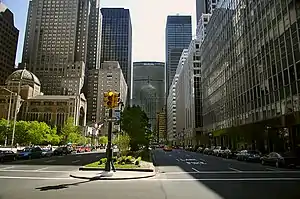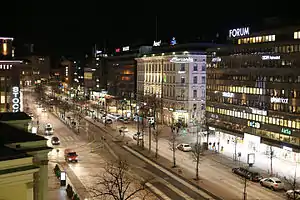
A boulevard is a type of broad avenue planted with rows of trees, or in parts of North America, any urban highway.
Boulevards were originally circumferential roads following the line of former city walls.
In North American usage, boulevards may be wide, multi-lane thoroughfares divided with only a central median.
Etymology
The word boulevard is borrowed from French. In French, it originally meant the flat surface of a rampart, and later a promenade taking the place of a demolished fortification. It is a borrowing from the Dutch word bolwerk 'bulwark'.[1]
Notable examples
Asia
Azerbaijan
Cambodia
India
Indonesia
Vietnam
- Thang Long Boulevard
Iran
Boulevards of Asia
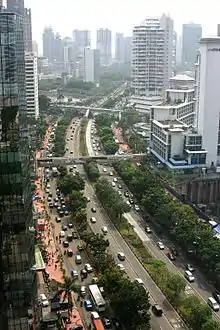
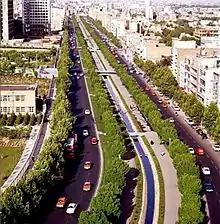 Keshavarz Boulevard of Tehran in mid 1970s
Keshavarz Boulevard of Tehran in mid 1970s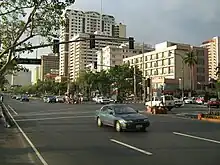 Roxas Boulevard in Manila
Roxas Boulevard in Manila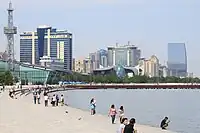
Australia and Oceania
Australia
- St Kilda Road, Melbourne
- Royal Parade, Melbourne
- Victoria Parade, Melbourne
- Flemington Road, Melbourne
- Mount Alexander Road, Melbourne
- The Boulevard, Perth
New Zealand
- The Four Avenues, Christchurch
- Anzac Avenue, Dunedin
- Marine Parade, Napier
Boulevards of Oceania
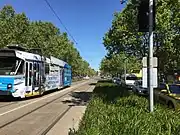 St Kilda Road, Melbourne
St Kilda Road, Melbourne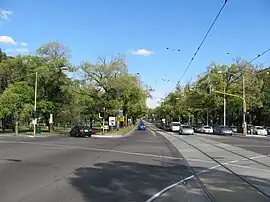
 Marine Parade, Napier
Marine Parade, Napier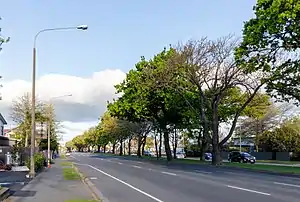 Bealey Avenue, one of Christchurch's Four Avenues
Bealey Avenue, one of Christchurch's Four Avenues
Europe
Austria
Denmark
France
Germany
- Unter den Linden, Berlin
- Kurfürstendamm, Berlin
- Karl-Marx-Allee, Berlin
- Königsallee, Düsseldorf
- Boulevard der Stars
- Brienner Straße
- Leopoldstraße
- Maximilianstraße
- Prinzregentenstraße
Hungary
- Little Boulevard, Budapest
- Grand Boulevard, Budapest
- Hungária Boulevard, Budapest[3]
Ireland
- O'Connell Street, Dublin
Italy
- Viali di Circonvallazione, Florence
Spain
- Gran Via de les Corts Catalans
- Avinguda de la Granvia
- Avinguda Diagonal, Barcelona
Portugal
- Avenida da Liberdade, Lisbon
Russia
- Boulevard Ring, Moscow
- Garden Ring, Moscow
Boulevards of Europe
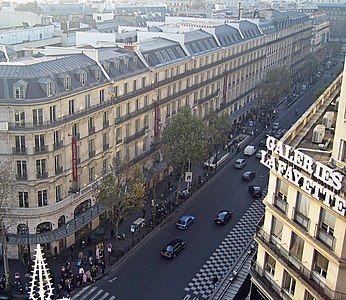 Boulevard Haussmann in Paris
Boulevard Haussmann in Paris Combino Supra at the Grand Boulevard in Budapest
Combino Supra at the Grand Boulevard in Budapest_33.JPG.webp) Boulevard in Florence
Boulevard in Florence Avinguda Diagonal in Barcelona
Avinguda Diagonal in Barcelona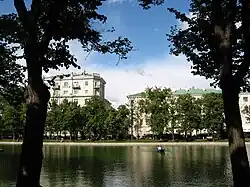 Clean Ponds in the wide median green of Chistoprudny Boulevard in Moscow
Clean Ponds in the wide median green of Chistoprudny Boulevard in Moscow
North America
Canada
- Lake Shore Boulevard, Toronto
- Pie-IX Boulevard, Montreal
Mexico
- Paseo de la Reforma, Mexico City
United States
- Ocean Parkway, Brooklyn
- Broadway, Manhattan
- Sunset Boulevard, Los Angeles
- Santa Monica Boulevard, Los Angeles
- Wilshire Boulevard, Los Angeles
- Hollywood Boulevard, Los Angeles
- Chicago Boulevard System
- Benjamin Franklin Parkway, Philadelphia
- Roosevelt Boulevard, Philadelphia
- Southern Boulevard Park, Philadelphia
- Boulevard, Atlanta
- Park Avenue, New York City
- Las Vegas Boulevard, Las Vegas
Boulevards of North America
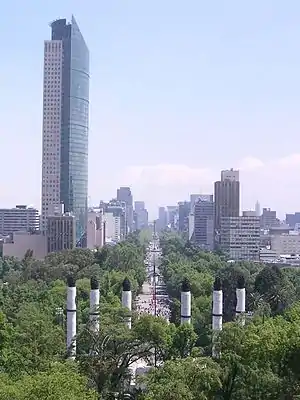 Mexico City's Paseo de la Reforma
Mexico City's Paseo de la Reforma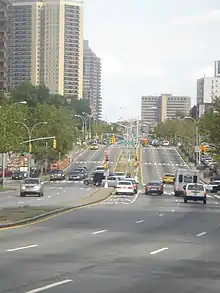 Queens Boulevard in New York City
Queens Boulevard in New York City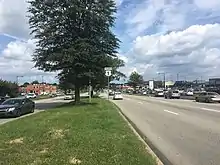 Roosevelt Boulevard in Philadelphia
Roosevelt Boulevard in Philadelphia
South America
Argentina
- Avenida 9 de Julio, Buenos Aires
Uruguay
- Artigas Boulevard, Montevideo
References
- ↑ Wiktionnaire,
- ↑ "Buses to Bring Change". Cebu Daily News. 20 June 2012. Retrieved 16 September 2017.
- ↑ "Húsvét után jön a nagykörúti káosz". Index.hu. 17 April 2006. Retrieved 16 September 2017.
- ↑ "Некоммерческий проект бульвары Москвы". Bulwar.ru. Archived from the original on 18 September 2017. Retrieved 16 September 2017.
Books
- Jacobs, Allan B.; Elizabeth Macdonald; Yodan Rofé (2003). The Boulevard Book. The MIT Press. ISBN 978-0-262-60023-1.
- Fiaccadori, Gianfranco; Malinverni, Alessandro; Mambriani, Carlo (2012). Guglielmo du Tillot: regista delle arti nell'età dei Lumi (in Italian). Parma: Fondazione Cariparma. ISBN 978-88-7898-064-8. OCLC 889616353.
- Pastega, Agostino Brotto (2010). Antonio Gaidon 1738-1829. Un professionista ante litteram dal rilievo mappale al boulevard. Bassano: Associazione Interprofessionale Bassanese.
External links
 The dictionary definition of boulevard at Wiktionary
The dictionary definition of boulevard at Wiktionary- Boulevards in Vietnam
This article is issued from Wikipedia. The text is licensed under Creative Commons - Attribution - Sharealike. Additional terms may apply for the media files.
